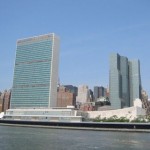 Yesterday, UN Secretary-General Ban Ki-moon stressed the importance of making energy available to the poor as a foundation for combating poverty as world leaders gathered in New York this week at the Millennium Development Goal Summit.
Yesterday, UN Secretary-General Ban Ki-moon stressed the importance of making energy available to the poor as a foundation for combating poverty as world leaders gathered in New York this week at the Millennium Development Goal Summit.
At a high-level event yesterday, the Secretary General said that it is lack of political will that is keeping poor communities worldwide from increased access to energy, and he called on countries to work together to create access initiatives.
We couldn’t agree more, and we hope this encourages world leaders to focus more on where taxpayer dollars are going. Will governments continue to overfund Big Oil, or will they shift their energy dollars to initiatives to improve energy access and increase production of clean energy?
Meanwhile, the International Energy Agency (IEA) encouraged the use of renewable energy to meet the needs of the world’s poorest in the face of rising oil prices.
According to Nobuo Tanaka, executive director of the IEA, “Higher energy prices have a very large impact on the poorest populations. That is why we think that renewables are often the best solution. The issue is how you finance these projects initially.”
In an excerpt of the 2010 World Energy Outlook released yesterday, the IEA estimates that 1.4 billion people worldwide – more than 20 percent of the global population – are without access to electricity, while an even greater 2.7 billion are without access to modern energy services for cooking and heating. Rural areas, particularly in sub-Saharan Africa, pose the largest challenges to increasing access.
This scale of this problem seems staggering, but Mr. Ban and Mr. Tanaka are right on target – we have the technology to address energy access in a sustainable way. We need our leaders to take the right steps and demand adequate finance from our public institutions to help the poor achieve energy access in a sustainable way.
But as long as governments are funding fossil fuel companies to the tune of $100 billion annually in production subsidies, the world’s poorest and our global environment will continue to suffer.
If you’d like to tell our President that you’d like to end subsidies and support clean energy and energy access, you can take action here.
